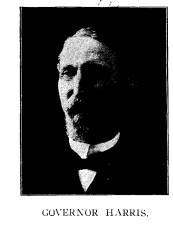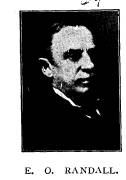Ohio History Journal
|
The Croghan Celebration. 31
liberty that we are enjoying to-day, and I wish to say that upon this spot, this historic spot that the tide turned in favor of the American nation, in the war of 1812-13. How unfortunate you are to have within your corporate limits the most historic spot in the United States of America. I never stood upon this ground, upon this battlefield until to- day. My mind turns back to my youthful days, when I read of the |
|
|
|
ory of the American people, in the person of Col. Webb C. Hayes. I thank you for your attention for you must be getting tired and I will leave you, saying that I am glad it was my privilege to be with you to-day, and I will ever remember this meeting as long as I live. This day will be deep in my memory.
ADDRESS OF E. O. RANDALL.
SECRETARY OHIO ARCHAEOLOGICAL AND HISTORICAL SOCIETY. The only apology I have for the honor of appearing before you on this interesting occasion is that my college friend of years ago, your splendid, patriotic and enterprising fellow-citizen, Colonel Webb. C. Hayes, invited me to come; his apology being that I am an official of the Ohio State Archaeological and Historical Society, whose business it is to gather, preserve and disseminate the lore, historic and prehistoric of our great state. The orator of the day, the Hon. Samuel D. Dodge, has recited to you in graphic terms the history that led up to the siege of Fort Stephenson and the incomparable bravery and patriotism with which the youth George Croghan and his gallant little band defended the crude stockade fort and stemmed the tide that to that moment seemed against the Americans. The successful repulse of Proctor and the British |
|
32 Ohio Arch. and Hist. Society Publications.
soldiers and Tecumseh, with his hundreds of braves, was the first real victory on Ohio soil in the War of 1812. That we may all the more appreciate the extent and significance of that event, let us for purposes of comparison look to other parts of the world, and note some of the stupendous acts that were being performed in the theatre of great things. In this very month, indeed on this very day and the days fol- lowing, in August, 1813, Bolivar, known as the Liberator and often called the Washington of South America, as the head of several hundred vol- unteer revolutionists, was entering as conqueror, Caracas, the capital of Venezuela, which country was thus freed from the oppression of Spanish monarchial rule and became one of the first republics of South America. In Europe a greater scene was being enacted. The incomparable Napo- leon was engaged in that series of military movements on the banks of the Elbe, which were the crowning events of his generalship and the culmination of his career. At this date (August 1813) Napoleon was |
|
|
|
of the Ohio Valley, devoid of the "pomp and circumstance" of gigantic war, was being fought the battle for freedom and the best form of demo- cratic government ever given man. Here, in this little stockade fort George Croghan, a native American lad, with but 160 men, heroes of struggle and sacrifice with a might almost miraculous, repelled the forces of the British under Proctor, with 500 of the weathered veterans of the Peninsula War, the trained troops of the victorious Wellington and two thousand or more Indian braves under command of Tecumseh, the most sagacious and daring leader of his race. How did George Croghan do it? He had the versatility as well as the valor of the pioneer soldier. He had but one mounted gun, "Old Betsy," whose venerable presence now stands guard over the new grave of her old commander,-this one cannon Croghan so deftly shifted behind the stockade walls, firing a shot now through one port-hole and then through another, that the enemy were fooled into the idea that Fort Stephenson was "chuck full" of firing |
The Croghan Celebration. 33
Betsies. The bravery of this American
boy and his dauntless band ex-
ceeded in results for the betterment of
humanity arid the advance of
civilization all the campaigns combined
of Napoleon and his antagonists.
Croghan and his 160 followers were
victorious because they were typical
pioneer Americans- Americans, a new type
of character in the history
of the world. Someone has said that God
sifted four races to produce
the American. Each one of you within the
sound of my voice can
vividly recollect how on that
magnificent May morning, 1898, Dewey
sailed into the Bay of Manila and almost
in the twinkling of an eye sunk
the Spanish fleet, without the loss of a
single American sailor and
scarcely the scratching of the paint
from any of the American ships.
We thought that that was the most
unparalleled event in history and
could never be repeated, but in sixty
days thereafter it was encored in
the Bay of Santiago when the fleet of
Cervera emerged and on that
July Sunday morning left the bay for the
sea to encounter the storm
of fire and shot from the ships of
Sampson and Schley. The war cor-
respondent of the London Times, one
who for the last forty years had
been an eye-witness of the chief
military and naval feats, both in the
old world and the new, gave in his paper
a most graphic picture of this
battle of Santiago, which he viewed from
the deck of one of the American
vessels. At the close of his vivid
description, he made the significant
remark that the behavior of the American
sailor was one of the most
marvelous exhibitions of coolness,
bravery and accuracy he had ever wit-
nessed. Said he, "I verily believe
that had those rival seamen exchanged
places, namely, had the Spanish sailors
possessed the modern, thoroughly
equipped American ships and thus emerged
from the bay, and had the
American sailors possessed the decrepid
and time-worn ships of Spain,
the result would have been the same,
namely, that the Americans
would have won the victory, because that
victory was won by the char-
acter of the American boy who manned the
American ships." The
American boy, Croghan, who defended Fort
Stephenson against such tre-
mendous odds was the same type as the
sailors of Dewey and Sampson
and Schley and the followers of the
generals who led in the Spanish
War. It is related that when the Sultan
of Turkey heard of the great
victory of the Americans at Manila and
Santiago, he sent for the Amer-
ican ambassador and asked him if the
reports of the marvelous feats
of the Americans were true. The
ambassador replied that they were,
when the sultan asked if he could buy
ships and guns like those which
the Americans employed. The ambassador
told him that he supposed
the sultan could get them, they were
made in America for money by
great manufacturers. "Then,"
said the sultan, "I will buy some of them
that I may win great victories."
"Oh," said the ambassador, "that you
can do; but you cannot buy the American
boys to man them for you."
It is of such men and boys as those who
fought the American Revolution,
Vol. XVI- 3.
34 Ohio Arch. and
Hist. Society Publications.
the War of 1812, of 1848, the Rebellion
of 61-5 and the Spanish War
that this republic is composed. Your
Vice-President and your Governor
have told you in eloquent language of
the heroism and patriotism of
the American soldiers in those wars for
independence, unity, liberty and
humanity. It is a noble record of a
noble people and in that record
Ohio has taken a most conspicuous part.
Three thousand Revolutionary
soldiers, scarred and wearied after the
battles for independence, came
across the Alleghanies to establish
homes for their declining years in the
peaceful and fruitful plains and valleys
of Ohio. Their lives had been
dedicated to independence and freedom
and their buried bones made
sacred the soil of Ohio. The seed of
that Revolutionary patriotism
ripened into an hundred fold in the war
for the national Union, for
300,000 loyal recruits went forth from
the "Buckeye State" to fight on
the battle-fields of the Sunny South for
the preservation of the republic
whose foundation was laid by their
revered sires. In the crypt of St.
Paul's Cathedral, London, that splendid
temple erected to the faith of
Christianity, lie the remains of its
great architect, Christopher Wren.
They repose beneath the floor in which
is sunken a simple plate, upon
which is inscribed the name
"Christopher Wren," and the Latin inscrip-
tion "si monumentum requiris,
circumspice"; if you seek his monument,
look about you. So I say, we may erect
monuments, the graven metal
or carved marble, to the heroes of the
past, not for them, for they
need them not, but for us that this
reminder of their heroic deeds may
lead us to emulate their examples and
push on to loftier heights. No,
I would say of George Croghan and the
heroes of 1776 and 1812, if you
should ask for their monument, look
about you and contemplate the mag-
nificent republic of which they laid the
corner-stone, a republic whose
people present the highest of type character
and civilization and whose
principles of liberty and humanity are
being borne to all the inhabitants
of the earth and the islands of the sea.
James A. Garfield, than whom
there was no more exalted example of the
American citizen, soldier,
statesman, scholar and orator, a
martyred President from Ohio, at the
close of one of his brilliant addresses
used these words: "The history
of the worlds is a divine poem; the
history of every nation is a canto in
that poem; and the life of every man is
a word in that poem. The
harmony of that poem has ever been
resounding through the ages and
though its melody has been marred by the
roaring of cannon and the
groans of dying men, yet to the
Christian philosopher, to you and me,
that poem breathes a prophecy of more
happy and halcyon days to
come." What a word was the life of
George Croghan in that poem of
universal history--a word that was a
clarion note of bravery, heroism
and patriotism, a note that shall ever
resound clear and distinct in the
harmony of American history.

